View in other NatureServe Network Field Guides
NatureServe
Montana
Utah
Wyoming
Idaho
Wisconsin
British Columbia
South Carolina
Yukon
California
New York
California False-hellebore - Veratrum californicum
State Rank Reason (see State Rank above)
Rare in Montana, where it is known from a very localized area in the southwestern corner of the state.
General Description
California False-hellebore is a robust, herbaceous perennial with solitary, unbranched stems that are 1-2 m high and arising from thick rhizomes. The numerous, alternate, broadly elliptic, sessile leaves are 2-3 dm long, and they have entire margins and parallel veins and sheath the stem at the base. Foliage is glabrous below, with the stem becoming densely short-hairy above. The nearly sessile flowers are crowded in a narrow, erectly branched inflorescence that is 3-6 dm long. Each flower has 6 white, petal-like, narrowly elliptic tepals that are 10-15 mm long with green markings at the base. There are 6 stamens that are less than 1/2 as long as the tepals and a glabrous ovary that matures into an egg-shaped capsule that is 2-3 cm long.
Phenology
Flowering in July-August.
Diagnostic Characteristics
The more common and widespread Veratrum viride has greenish flowers, with petals that are 6-10 mm long and arranged on drooping branches of an open inflorescence.
Species Range
Montana Range
Range Descriptions
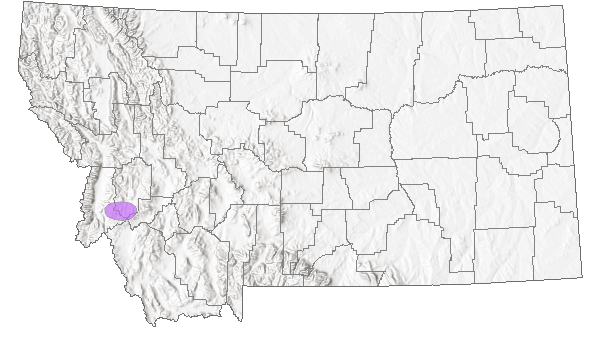
 Native
Native
Range Comments
In Granite County; WA to MT south to CA, AZ and NM (Lesica et al. 2012. Manual of Montana Vascular Plants. BRIT Press. Fort Worth, TX).
Observations in Montana Natural Heritage Program Database
Number of Observations: 32
(Click on the following maps and charts to see full sized version)
Map Help and Descriptions
Relative Density
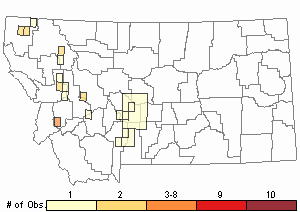
Recency
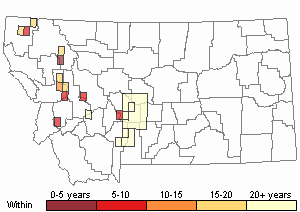
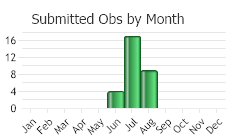
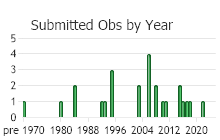
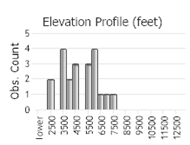 (Observations spanning multiple months or years are excluded from time charts)
(Observations spanning multiple months or years are excluded from time charts)
Habitat
Wet meadows and streambanks in the montane and subalpine zones.
National Vegetation Classification System Groups Associated with this Species
Forest and Woodland
Montane - Subalpine Forest and Woodland
Grassland
Montane - Subalpine Grassland
Wetland and Riparian
Alpine Riparian and Wetland
Riparian and Wetland Forest
Riparian Shrubland
Wet Meadow and Marsh
Ecology
POLLINATORS The following animal species have been reported as pollinators of this plant species or its genus where their geographic ranges overlap:
Bombus insularis and
Bombus flavidus (Thorp et al. 1983).
Stewardship Responsibility
Threats or Limiting Factors
STATE THREAT SCORE REASON
Reported threats to Montana's populations of California False-hellebore are due to concentrated elk trampling and browsing. Seed head browsing and bedding are observed annually at some populations, and is likely to have minor negative impacts to populations (MTNHP Threat Assessment 2021).
References
- Literature Cited AboveLegend:
 View Online Publication
View Online Publication Lesica, P., M.T. Lavin, and P.F. Stickney. 2012. Manual of Montana Vascular Plants. Fort Worth, TX: BRIT Press. viii + 771 p.
Lesica, P., M.T. Lavin, and P.F. Stickney. 2012. Manual of Montana Vascular Plants. Fort Worth, TX: BRIT Press. viii + 771 p. MTNHP Threat Assessment. 2021. State Threat Score Assignment and Assessment of Reported Threats from 2006 to 2021 for State-listed Vascular Plants. Botany Program, Montana Natural Heritage Program, Helena, Montana.
MTNHP Threat Assessment. 2021. State Threat Score Assignment and Assessment of Reported Threats from 2006 to 2021 for State-listed Vascular Plants. Botany Program, Montana Natural Heritage Program, Helena, Montana. Thorp, R.W., D.S. Horning, and L.L. Dunning. 1983. Bumble bees and cuckoo bumble bees of California (Hymenoptera: Apidae). Bulletin of the California Insect Survey 23:1-79.
Thorp, R.W., D.S. Horning, and L.L. Dunning. 1983. Bumble bees and cuckoo bumble bees of California (Hymenoptera: Apidae). Bulletin of the California Insect Survey 23:1-79.
- Additional ReferencesLegend:
 View Online Publication
View Online Publication
Do you know of a citation we're missing? Aradottir, A.L. 1984. Ammonia volatilization from native grasslands and forests of SW Montana. M.Sc. Thesis. Bozeman, MT: Montana State University. 48 p.
Aradottir, A.L. 1984. Ammonia volatilization from native grasslands and forests of SW Montana. M.Sc. Thesis. Bozeman, MT: Montana State University. 48 p. Jones, W. W. 1901. Preliminary flora of Gallatin County. M.S. Thesis. Bozeman, MT: Montana State College. 78 pp.
Jones, W. W. 1901. Preliminary flora of Gallatin County. M.S. Thesis. Bozeman, MT: Montana State College. 78 pp. Lesica, P., M.T. Lavin, and P.F. Stickney. 2022. Manual of Montana Vascular Plants, Second Edition. Fort Worth, TX: BRIT Press. viii + 779 p.
Lesica, P., M.T. Lavin, and P.F. Stickney. 2022. Manual of Montana Vascular Plants, Second Edition. Fort Worth, TX: BRIT Press. viii + 779 p.
- Web Search Engines for Articles on "California False-hellebore"





